Corporate Social Responsibility: CEO and Board Leadership Traits
VerifiedAdded on 2020/01/23
|23
|4109
|184
Essay
AI Summary
This essay delves into the realm of Corporate Social Responsibility (CSR), examining the pivotal role played by Chief Executive Officers (CEOs) and Boards of Directors in fostering socially responsible business practices. The introduction establishes the significance of CSR, contrasting profit-driven motives with societal benefits, and highlighting the impact of stakeholder perception. The essay then critically analyzes CSR, emphasizing the importance of CEO vision and board composition in integrating CSR into company strategies. It explores the application of agency theory, stewardship theory, and stakeholder theory to understand the dynamics between corporate leadership and CSR implementation. A comprehensive literature review further supports the arguments, citing various studies and examples to illustrate the influence of legal environments and institutional factors on CSR initiatives. The essay also examines the role of corporate governance and the significance of ethical considerations in decision-making processes. The essay emphasizes the importance of leadership traits, such as vision and ethical decision-making, in successfully integrating CSR principles within an organization. The essay concludes by underscoring the need for leaders who prioritize the well-being of both business and society, ultimately enhancing brand value and promoting economic growth.

Corporate Social Responsibility (CSR)
Identify and discuss the characteristics of CEOs and Boards that help
lead to more socially responsible companies
Identify and discuss the characteristics of CEOs and Boards that help
lead to more socially responsible companies
Paraphrase This Document
Need a fresh take? Get an instant paraphrase of this document with our AI Paraphraser
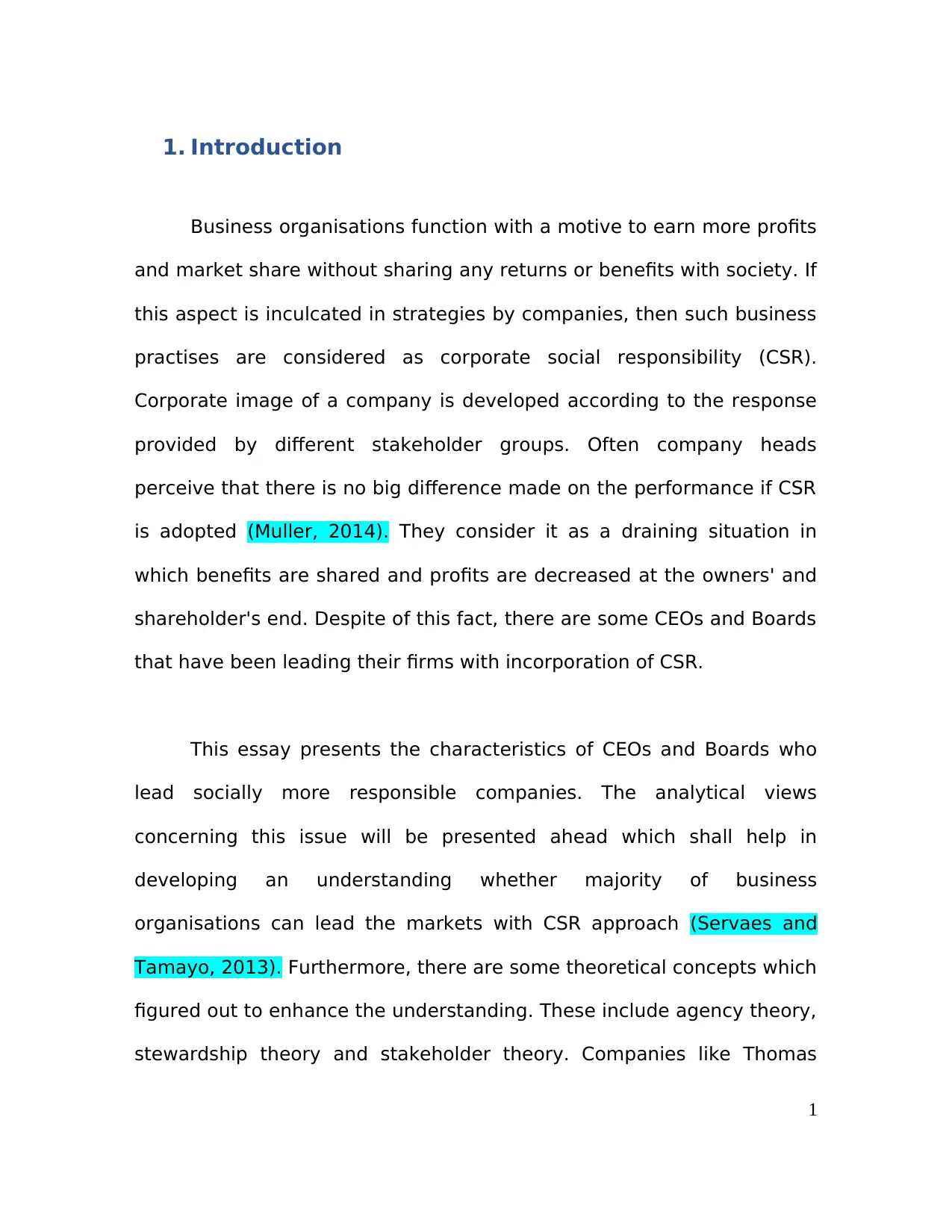
1. Introduction
Business organisations function with a motive to earn more profits
and market share without sharing any returns or benefits with society. If
this aspect is inculcated in strategies by companies, then such business
practises are considered as corporate social responsibility (CSR).
Corporate image of a company is developed according to the response
provided by different stakeholder groups. Often company heads
perceive that there is no big difference made on the performance if CSR
is adopted (Muller, 2014). They consider it as a draining situation in
which benefits are shared and profits are decreased at the owners' and
shareholder's end. Despite of this fact, there are some CEOs and Boards
that have been leading their firms with incorporation of CSR.
This essay presents the characteristics of CEOs and Boards who
lead socially more responsible companies. The analytical views
concerning this issue will be presented ahead which shall help in
developing an understanding whether majority of business
organisations can lead the markets with CSR approach (Servaes and
Tamayo, 2013). Furthermore, there are some theoretical concepts which
figured out to enhance the understanding. These include agency theory,
stewardship theory and stakeholder theory. Companies like Thomas
1
Business organisations function with a motive to earn more profits
and market share without sharing any returns or benefits with society. If
this aspect is inculcated in strategies by companies, then such business
practises are considered as corporate social responsibility (CSR).
Corporate image of a company is developed according to the response
provided by different stakeholder groups. Often company heads
perceive that there is no big difference made on the performance if CSR
is adopted (Muller, 2014). They consider it as a draining situation in
which benefits are shared and profits are decreased at the owners' and
shareholder's end. Despite of this fact, there are some CEOs and Boards
that have been leading their firms with incorporation of CSR.
This essay presents the characteristics of CEOs and Boards who
lead socially more responsible companies. The analytical views
concerning this issue will be presented ahead which shall help in
developing an understanding whether majority of business
organisations can lead the markets with CSR approach (Servaes and
Tamayo, 2013). Furthermore, there are some theoretical concepts which
figured out to enhance the understanding. These include agency theory,
stewardship theory and stakeholder theory. Companies like Thomas
1
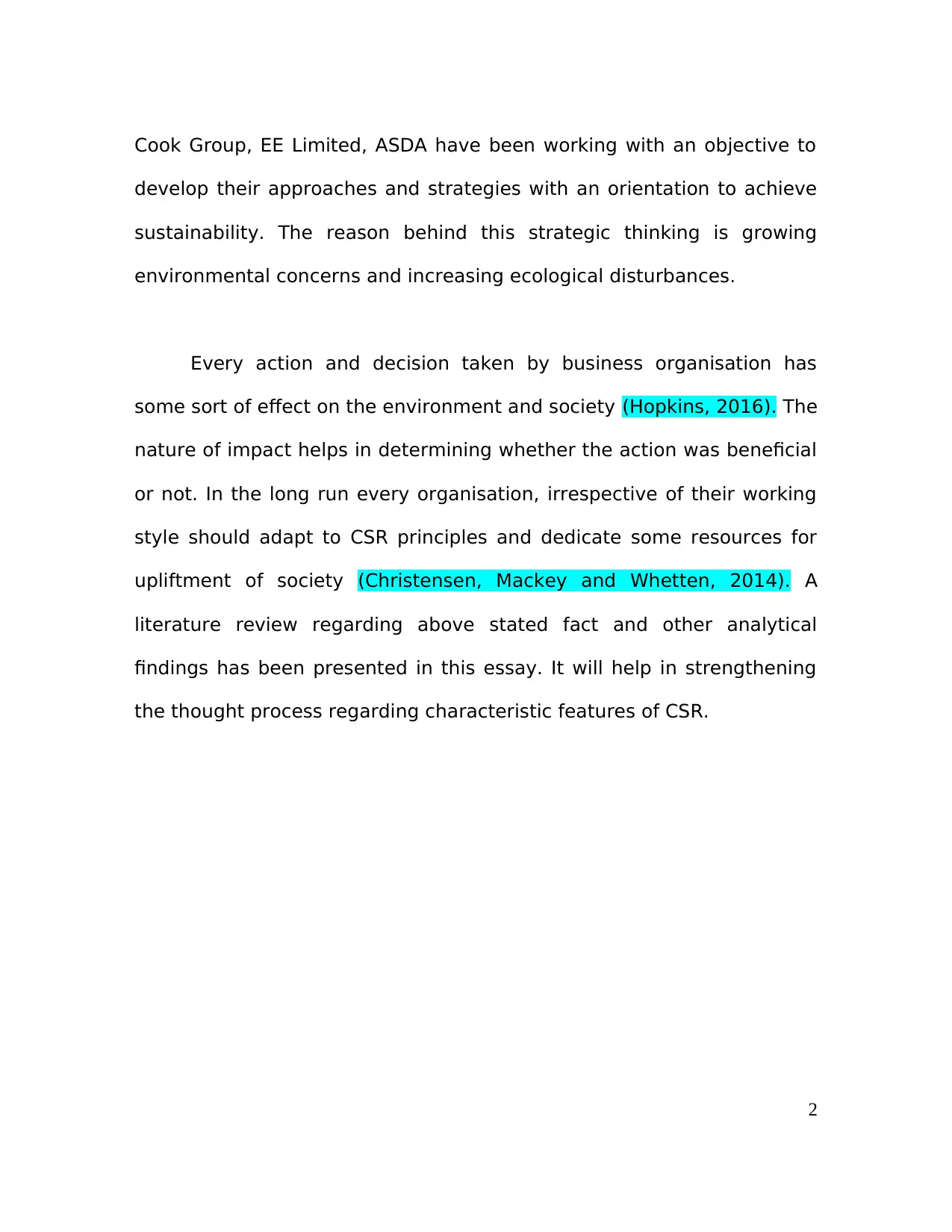
Cook Group, EE Limited, ASDA have been working with an objective to
develop their approaches and strategies with an orientation to achieve
sustainability. The reason behind this strategic thinking is growing
environmental concerns and increasing ecological disturbances.
Every action and decision taken by business organisation has
some sort of effect on the environment and society (Hopkins, 2016). The
nature of impact helps in determining whether the action was beneficial
or not. In the long run every organisation, irrespective of their working
style should adapt to CSR principles and dedicate some resources for
upliftment of society (Christensen, Mackey and Whetten, 2014). A
literature review regarding above stated fact and other analytical
findings has been presented in this essay. It will help in strengthening
the thought process regarding characteristic features of CSR.
2
develop their approaches and strategies with an orientation to achieve
sustainability. The reason behind this strategic thinking is growing
environmental concerns and increasing ecological disturbances.
Every action and decision taken by business organisation has
some sort of effect on the environment and society (Hopkins, 2016). The
nature of impact helps in determining whether the action was beneficial
or not. In the long run every organisation, irrespective of their working
style should adapt to CSR principles and dedicate some resources for
upliftment of society (Christensen, Mackey and Whetten, 2014). A
literature review regarding above stated fact and other analytical
findings has been presented in this essay. It will help in strengthening
the thought process regarding characteristic features of CSR.
2
⊘ This is a preview!⊘
Do you want full access?
Subscribe today to unlock all pages.

Trusted by 1+ million students worldwide
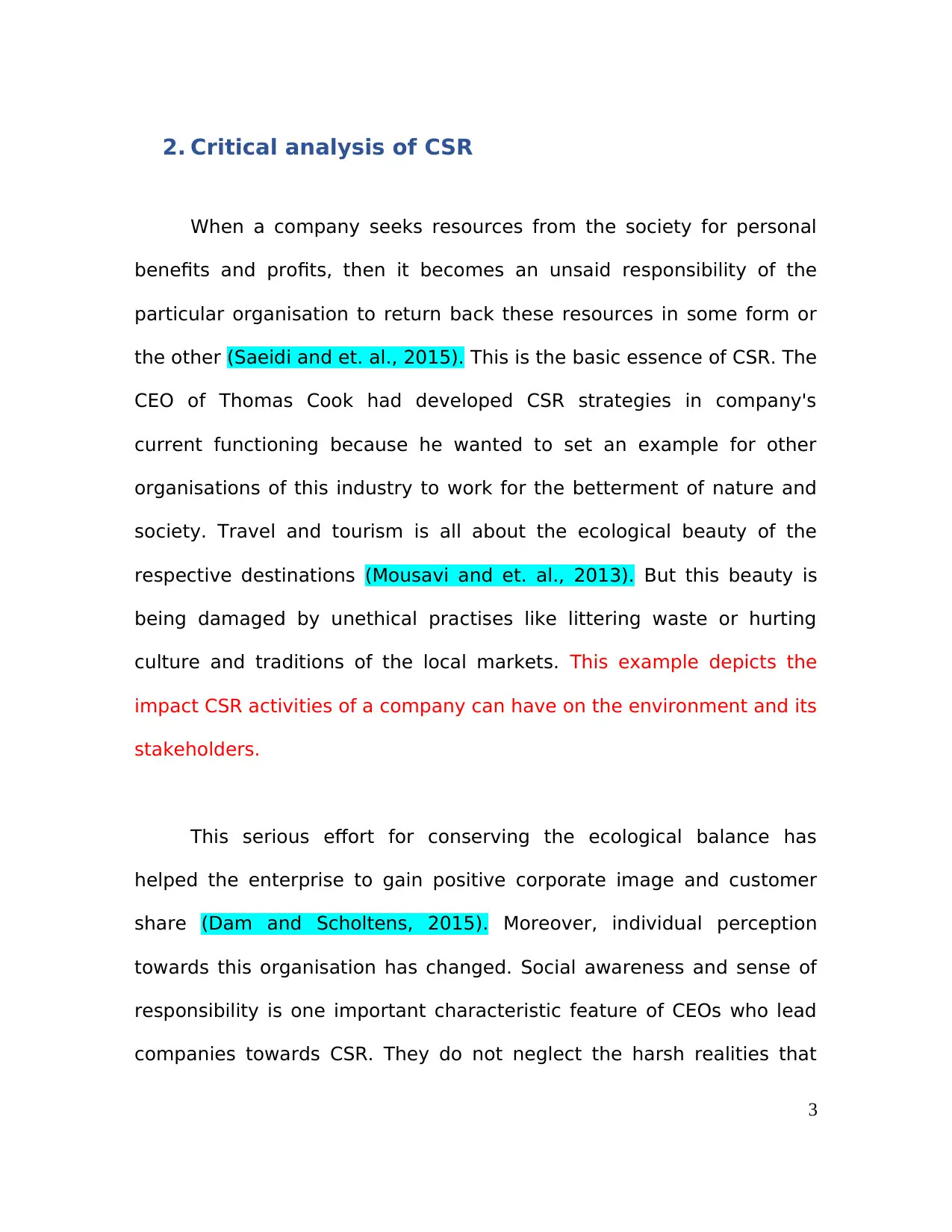
2. Critical analysis of CSR
When a company seeks resources from the society for personal
benefits and profits, then it becomes an unsaid responsibility of the
particular organisation to return back these resources in some form or
the other (Saeidi and et. al., 2015). This is the basic essence of CSR. The
CEO of Thomas Cook had developed CSR strategies in company's
current functioning because he wanted to set an example for other
organisations of this industry to work for the betterment of nature and
society. Travel and tourism is all about the ecological beauty of the
respective destinations (Mousavi and et. al., 2013). But this beauty is
being damaged by unethical practises like littering waste or hurting
culture and traditions of the local markets. This example depicts the
impact CSR activities of a company can have on the environment and its
stakeholders.
This serious effort for conserving the ecological balance has
helped the enterprise to gain positive corporate image and customer
share (Dam and Scholtens, 2015). Moreover, individual perception
towards this organisation has changed. Social awareness and sense of
responsibility is one important characteristic feature of CEOs who lead
companies towards CSR. They do not neglect the harsh realities that
3
When a company seeks resources from the society for personal
benefits and profits, then it becomes an unsaid responsibility of the
particular organisation to return back these resources in some form or
the other (Saeidi and et. al., 2015). This is the basic essence of CSR. The
CEO of Thomas Cook had developed CSR strategies in company's
current functioning because he wanted to set an example for other
organisations of this industry to work for the betterment of nature and
society. Travel and tourism is all about the ecological beauty of the
respective destinations (Mousavi and et. al., 2013). But this beauty is
being damaged by unethical practises like littering waste or hurting
culture and traditions of the local markets. This example depicts the
impact CSR activities of a company can have on the environment and its
stakeholders.
This serious effort for conserving the ecological balance has
helped the enterprise to gain positive corporate image and customer
share (Dam and Scholtens, 2015). Moreover, individual perception
towards this organisation has changed. Social awareness and sense of
responsibility is one important characteristic feature of CEOs who lead
companies towards CSR. They do not neglect the harsh realities that
3
Paraphrase This Document
Need a fresh take? Get an instant paraphrase of this document with our AI Paraphraser
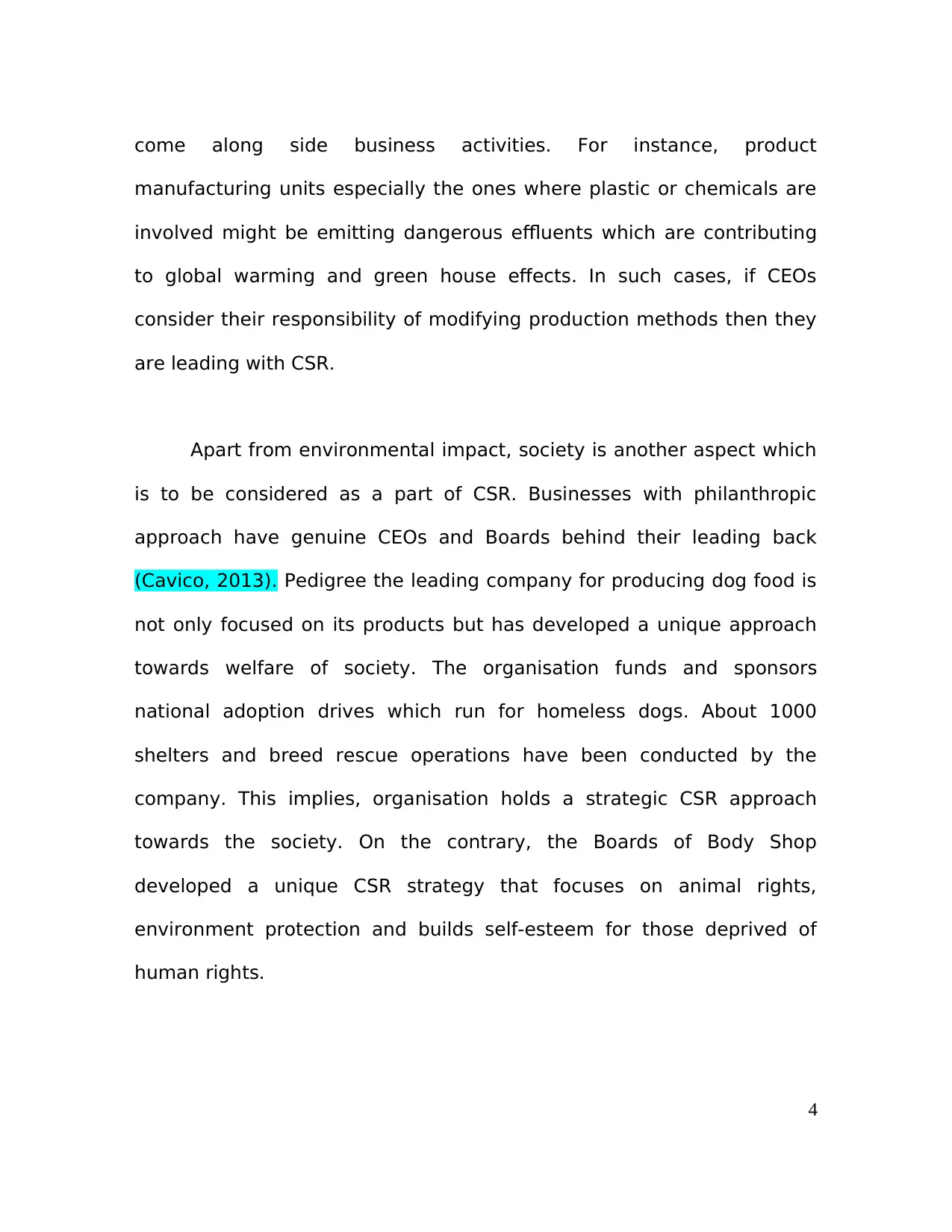
come along side business activities. For instance, product
manufacturing units especially the ones where plastic or chemicals are
involved might be emitting dangerous effluents which are contributing
to global warming and green house effects. In such cases, if CEOs
consider their responsibility of modifying production methods then they
are leading with CSR.
Apart from environmental impact, society is another aspect which
is to be considered as a part of CSR. Businesses with philanthropic
approach have genuine CEOs and Boards behind their leading back
(Cavico, 2013). Pedigree the leading company for producing dog food is
not only focused on its products but has developed a unique approach
towards welfare of society. The organisation funds and sponsors
national adoption drives which run for homeless dogs. About 1000
shelters and breed rescue operations have been conducted by the
company. This implies, organisation holds a strategic CSR approach
towards the society. On the contrary, the Boards of Body Shop
developed a unique CSR strategy that focuses on animal rights,
environment protection and builds self-esteem for those deprived of
human rights.
4
manufacturing units especially the ones where plastic or chemicals are
involved might be emitting dangerous effluents which are contributing
to global warming and green house effects. In such cases, if CEOs
consider their responsibility of modifying production methods then they
are leading with CSR.
Apart from environmental impact, society is another aspect which
is to be considered as a part of CSR. Businesses with philanthropic
approach have genuine CEOs and Boards behind their leading back
(Cavico, 2013). Pedigree the leading company for producing dog food is
not only focused on its products but has developed a unique approach
towards welfare of society. The organisation funds and sponsors
national adoption drives which run for homeless dogs. About 1000
shelters and breed rescue operations have been conducted by the
company. This implies, organisation holds a strategic CSR approach
towards the society. On the contrary, the Boards of Body Shop
developed a unique CSR strategy that focuses on animal rights,
environment protection and builds self-esteem for those deprived of
human rights.
4
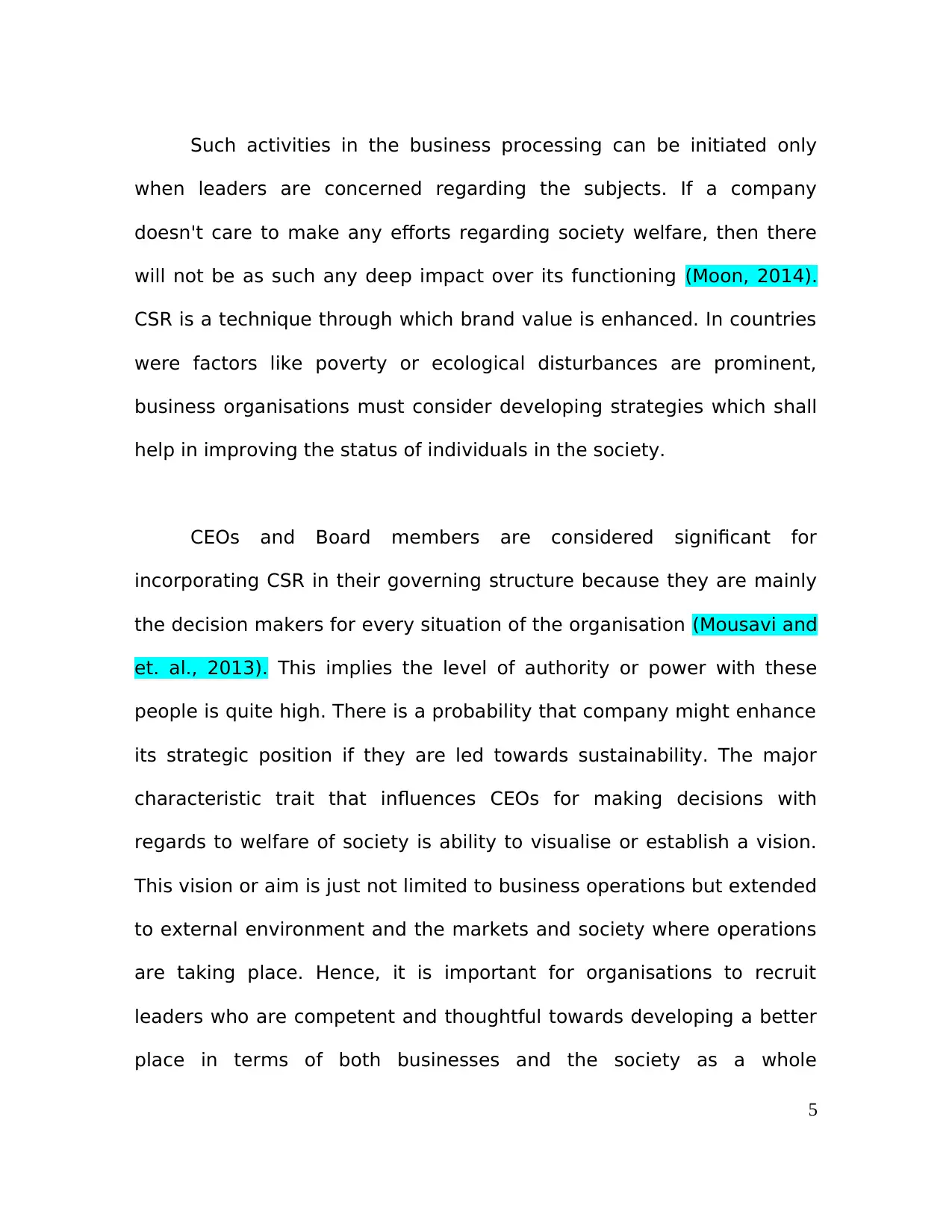
Such activities in the business processing can be initiated only
when leaders are concerned regarding the subjects. If a company
doesn't care to make any efforts regarding society welfare, then there
will not be as such any deep impact over its functioning (Moon, 2014).
CSR is a technique through which brand value is enhanced. In countries
were factors like poverty or ecological disturbances are prominent,
business organisations must consider developing strategies which shall
help in improving the status of individuals in the society.
CEOs and Board members are considered significant for
incorporating CSR in their governing structure because they are mainly
the decision makers for every situation of the organisation (Mousavi and
et. al., 2013). This implies the level of authority or power with these
people is quite high. There is a probability that company might enhance
its strategic position if they are led towards sustainability. The major
characteristic trait that influences CEOs for making decisions with
regards to welfare of society is ability to visualise or establish a vision.
This vision or aim is just not limited to business operations but extended
to external environment and the markets and society where operations
are taking place. Hence, it is important for organisations to recruit
leaders who are competent and thoughtful towards developing a better
place in terms of both businesses and the society as a whole
5
when leaders are concerned regarding the subjects. If a company
doesn't care to make any efforts regarding society welfare, then there
will not be as such any deep impact over its functioning (Moon, 2014).
CSR is a technique through which brand value is enhanced. In countries
were factors like poverty or ecological disturbances are prominent,
business organisations must consider developing strategies which shall
help in improving the status of individuals in the society.
CEOs and Board members are considered significant for
incorporating CSR in their governing structure because they are mainly
the decision makers for every situation of the organisation (Mousavi and
et. al., 2013). This implies the level of authority or power with these
people is quite high. There is a probability that company might enhance
its strategic position if they are led towards sustainability. The major
characteristic trait that influences CEOs for making decisions with
regards to welfare of society is ability to visualise or establish a vision.
This vision or aim is just not limited to business operations but extended
to external environment and the markets and society where operations
are taking place. Hence, it is important for organisations to recruit
leaders who are competent and thoughtful towards developing a better
place in terms of both businesses and the society as a whole
5
⊘ This is a preview!⊘
Do you want full access?
Subscribe today to unlock all pages.

Trusted by 1+ million students worldwide
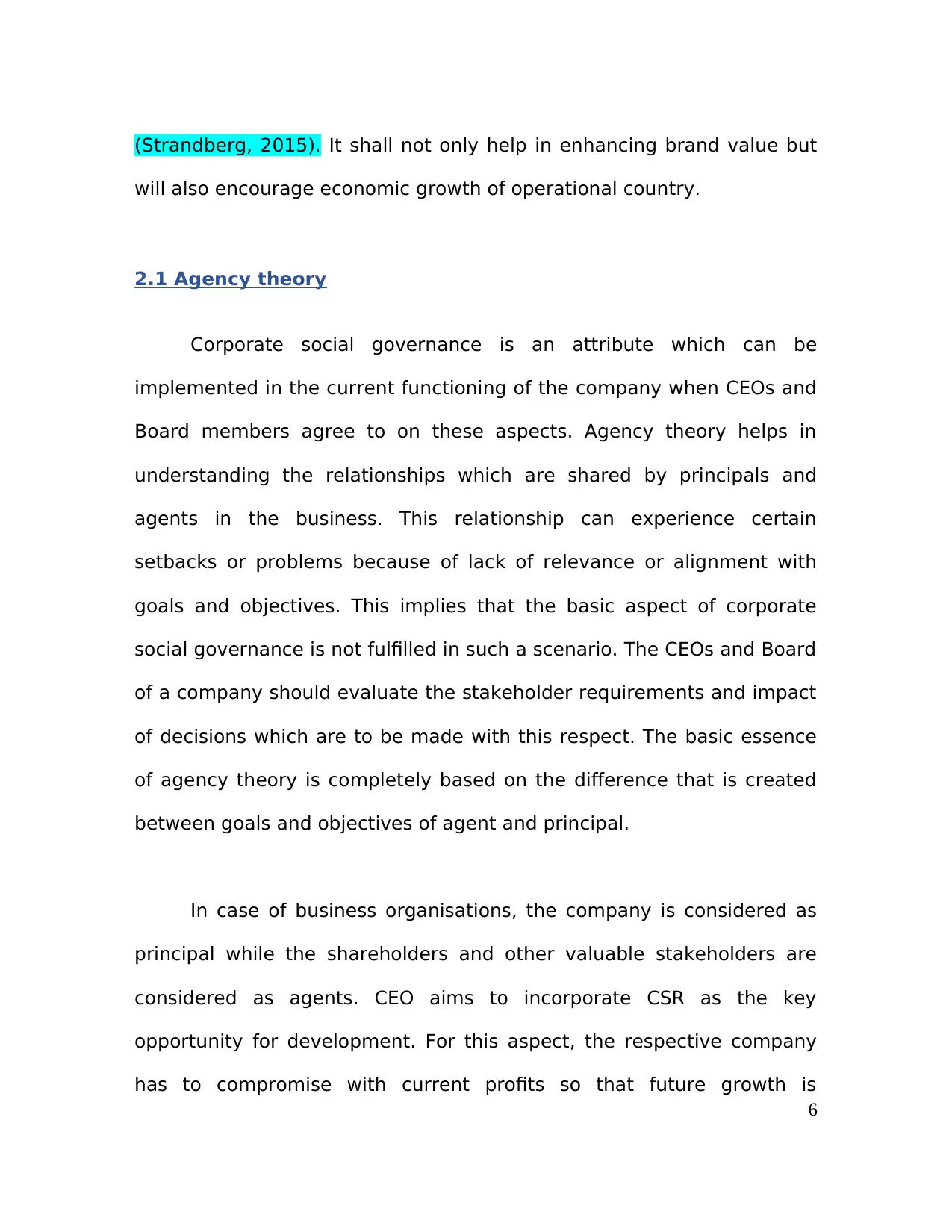
(Strandberg, 2015). It shall not only help in enhancing brand value but
will also encourage economic growth of operational country.
2.1 Agency theory
Corporate social governance is an attribute which can be
implemented in the current functioning of the company when CEOs and
Board members agree to on these aspects. Agency theory helps in
understanding the relationships which are shared by principals and
agents in the business. This relationship can experience certain
setbacks or problems because of lack of relevance or alignment with
goals and objectives. This implies that the basic aspect of corporate
social governance is not fulfilled in such a scenario. The CEOs and Board
of a company should evaluate the stakeholder requirements and impact
of decisions which are to be made with this respect. The basic essence
of agency theory is completely based on the difference that is created
between goals and objectives of agent and principal.
In case of business organisations, the company is considered as
principal while the shareholders and other valuable stakeholders are
considered as agents. CEO aims to incorporate CSR as the key
opportunity for development. For this aspect, the respective company
has to compromise with current profits so that future growth is
6
will also encourage economic growth of operational country.
2.1 Agency theory
Corporate social governance is an attribute which can be
implemented in the current functioning of the company when CEOs and
Board members agree to on these aspects. Agency theory helps in
understanding the relationships which are shared by principals and
agents in the business. This relationship can experience certain
setbacks or problems because of lack of relevance or alignment with
goals and objectives. This implies that the basic aspect of corporate
social governance is not fulfilled in such a scenario. The CEOs and Board
of a company should evaluate the stakeholder requirements and impact
of decisions which are to be made with this respect. The basic essence
of agency theory is completely based on the difference that is created
between goals and objectives of agent and principal.
In case of business organisations, the company is considered as
principal while the shareholders and other valuable stakeholders are
considered as agents. CEO aims to incorporate CSR as the key
opportunity for development. For this aspect, the respective company
has to compromise with current profits so that future growth is
6
Paraphrase This Document
Need a fresh take? Get an instant paraphrase of this document with our AI Paraphraser
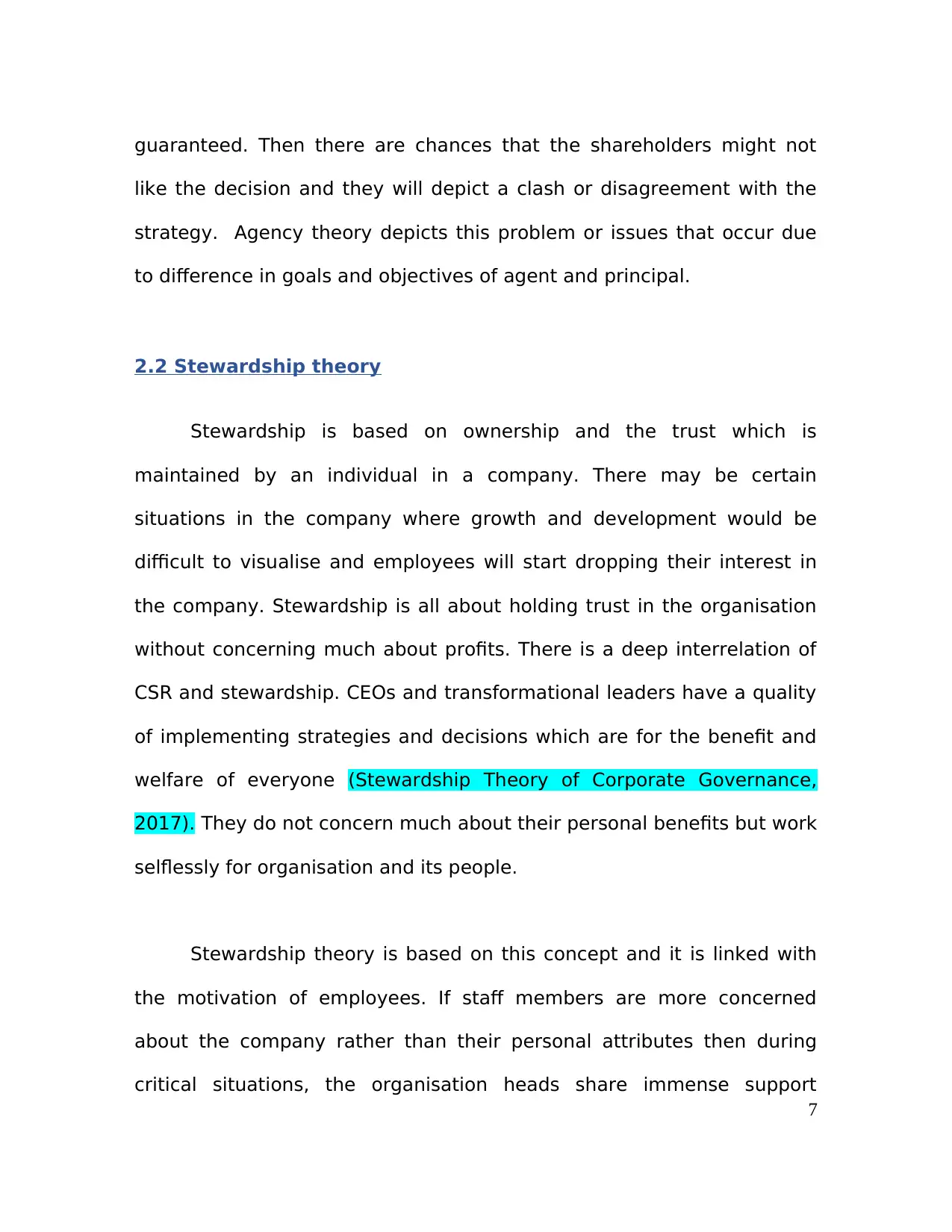
guaranteed. Then there are chances that the shareholders might not
like the decision and they will depict a clash or disagreement with the
strategy. Agency theory depicts this problem or issues that occur due
to difference in goals and objectives of agent and principal.
2.2 Stewardship theory
Stewardship is based on ownership and the trust which is
maintained by an individual in a company. There may be certain
situations in the company where growth and development would be
difficult to visualise and employees will start dropping their interest in
the company. Stewardship is all about holding trust in the organisation
without concerning much about profits. There is a deep interrelation of
CSR and stewardship. CEOs and transformational leaders have a quality
of implementing strategies and decisions which are for the benefit and
welfare of everyone (Stewardship Theory of Corporate Governance,
2017). They do not concern much about their personal benefits but work
selflessly for organisation and its people.
Stewardship theory is based on this concept and it is linked with
the motivation of employees. If staff members are more concerned
about the company rather than their personal attributes then during
critical situations, the organisation heads share immense support
7
like the decision and they will depict a clash or disagreement with the
strategy. Agency theory depicts this problem or issues that occur due
to difference in goals and objectives of agent and principal.
2.2 Stewardship theory
Stewardship is based on ownership and the trust which is
maintained by an individual in a company. There may be certain
situations in the company where growth and development would be
difficult to visualise and employees will start dropping their interest in
the company. Stewardship is all about holding trust in the organisation
without concerning much about profits. There is a deep interrelation of
CSR and stewardship. CEOs and transformational leaders have a quality
of implementing strategies and decisions which are for the benefit and
welfare of everyone (Stewardship Theory of Corporate Governance,
2017). They do not concern much about their personal benefits but work
selflessly for organisation and its people.
Stewardship theory is based on this concept and it is linked with
the motivation of employees. If staff members are more concerned
about the company rather than their personal attributes then during
critical situations, the organisation heads share immense support
7
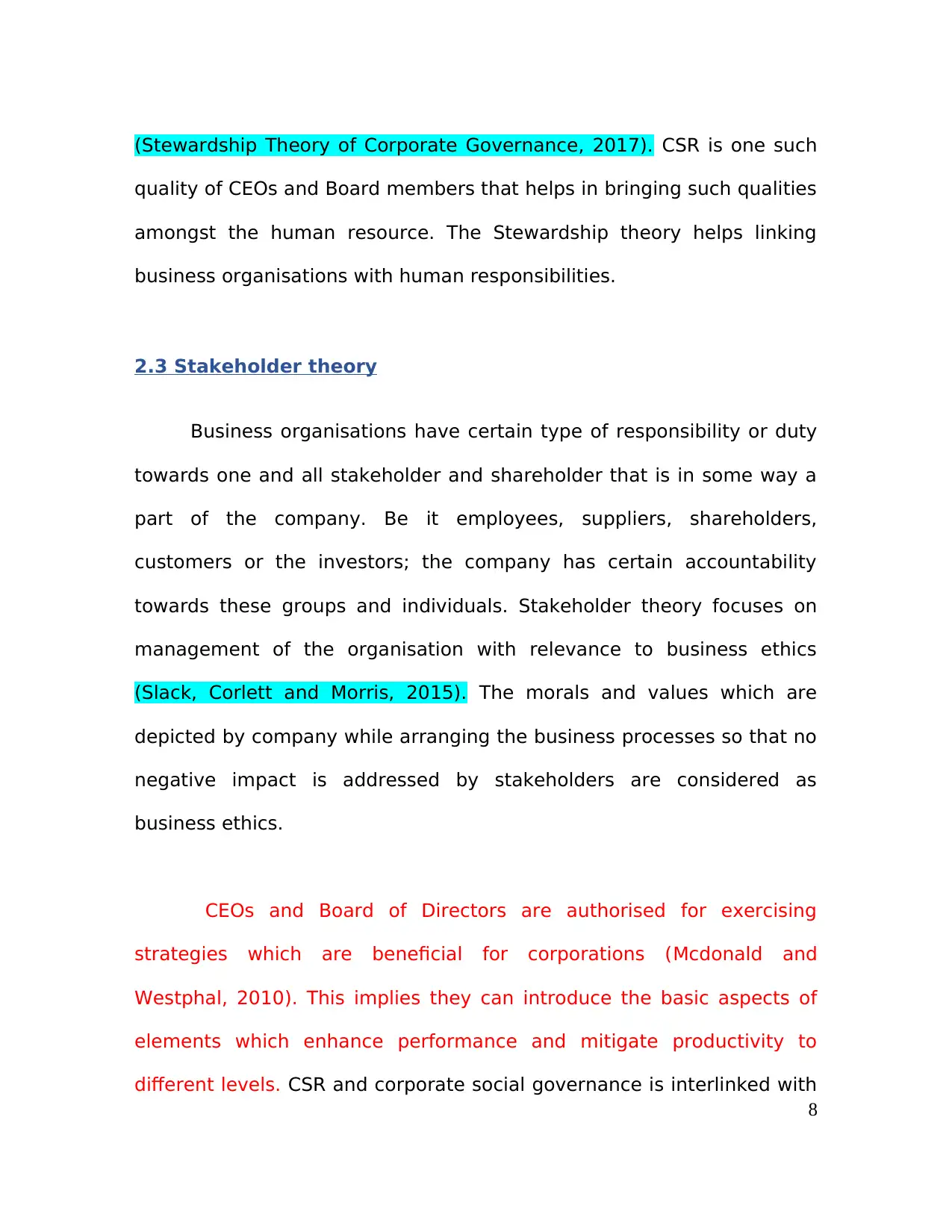
(Stewardship Theory of Corporate Governance, 2017). CSR is one such
quality of CEOs and Board members that helps in bringing such qualities
amongst the human resource. The Stewardship theory helps linking
business organisations with human responsibilities.
2.3 Stakeholder theory
Business organisations have certain type of responsibility or duty
towards one and all stakeholder and shareholder that is in some way a
part of the company. Be it employees, suppliers, shareholders,
customers or the investors; the company has certain accountability
towards these groups and individuals. Stakeholder theory focuses on
management of the organisation with relevance to business ethics
(Slack, Corlett and Morris, 2015). The morals and values which are
depicted by company while arranging the business processes so that no
negative impact is addressed by stakeholders are considered as
business ethics.
CEOs and Board of Directors are authorised for exercising
strategies which are beneficial for corporations (Mcdonald and
Westphal, 2010). This implies they can introduce the basic aspects of
elements which enhance performance and mitigate productivity to
different levels. CSR and corporate social governance is interlinked with
8
quality of CEOs and Board members that helps in bringing such qualities
amongst the human resource. The Stewardship theory helps linking
business organisations with human responsibilities.
2.3 Stakeholder theory
Business organisations have certain type of responsibility or duty
towards one and all stakeholder and shareholder that is in some way a
part of the company. Be it employees, suppliers, shareholders,
customers or the investors; the company has certain accountability
towards these groups and individuals. Stakeholder theory focuses on
management of the organisation with relevance to business ethics
(Slack, Corlett and Morris, 2015). The morals and values which are
depicted by company while arranging the business processes so that no
negative impact is addressed by stakeholders are considered as
business ethics.
CEOs and Board of Directors are authorised for exercising
strategies which are beneficial for corporations (Mcdonald and
Westphal, 2010). This implies they can introduce the basic aspects of
elements which enhance performance and mitigate productivity to
different levels. CSR and corporate social governance is interlinked with
8
⊘ This is a preview!⊘
Do you want full access?
Subscribe today to unlock all pages.

Trusted by 1+ million students worldwide
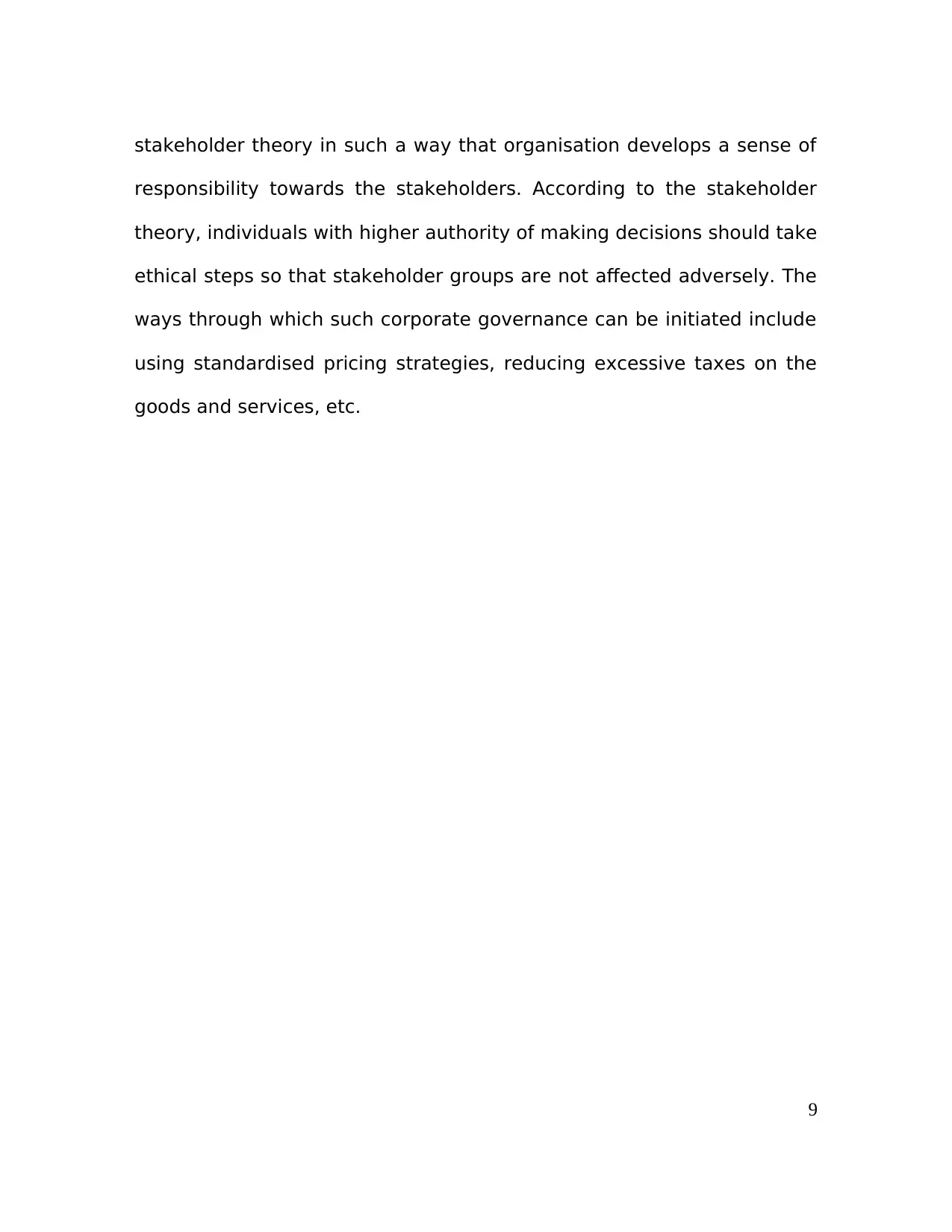
stakeholder theory in such a way that organisation develops a sense of
responsibility towards the stakeholders. According to the stakeholder
theory, individuals with higher authority of making decisions should take
ethical steps so that stakeholder groups are not affected adversely. The
ways through which such corporate governance can be initiated include
using standardised pricing strategies, reducing excessive taxes on the
goods and services, etc.
9
responsibility towards the stakeholders. According to the stakeholder
theory, individuals with higher authority of making decisions should take
ethical steps so that stakeholder groups are not affected adversely. The
ways through which such corporate governance can be initiated include
using standardised pricing strategies, reducing excessive taxes on the
goods and services, etc.
9
Paraphrase This Document
Need a fresh take? Get an instant paraphrase of this document with our AI Paraphraser
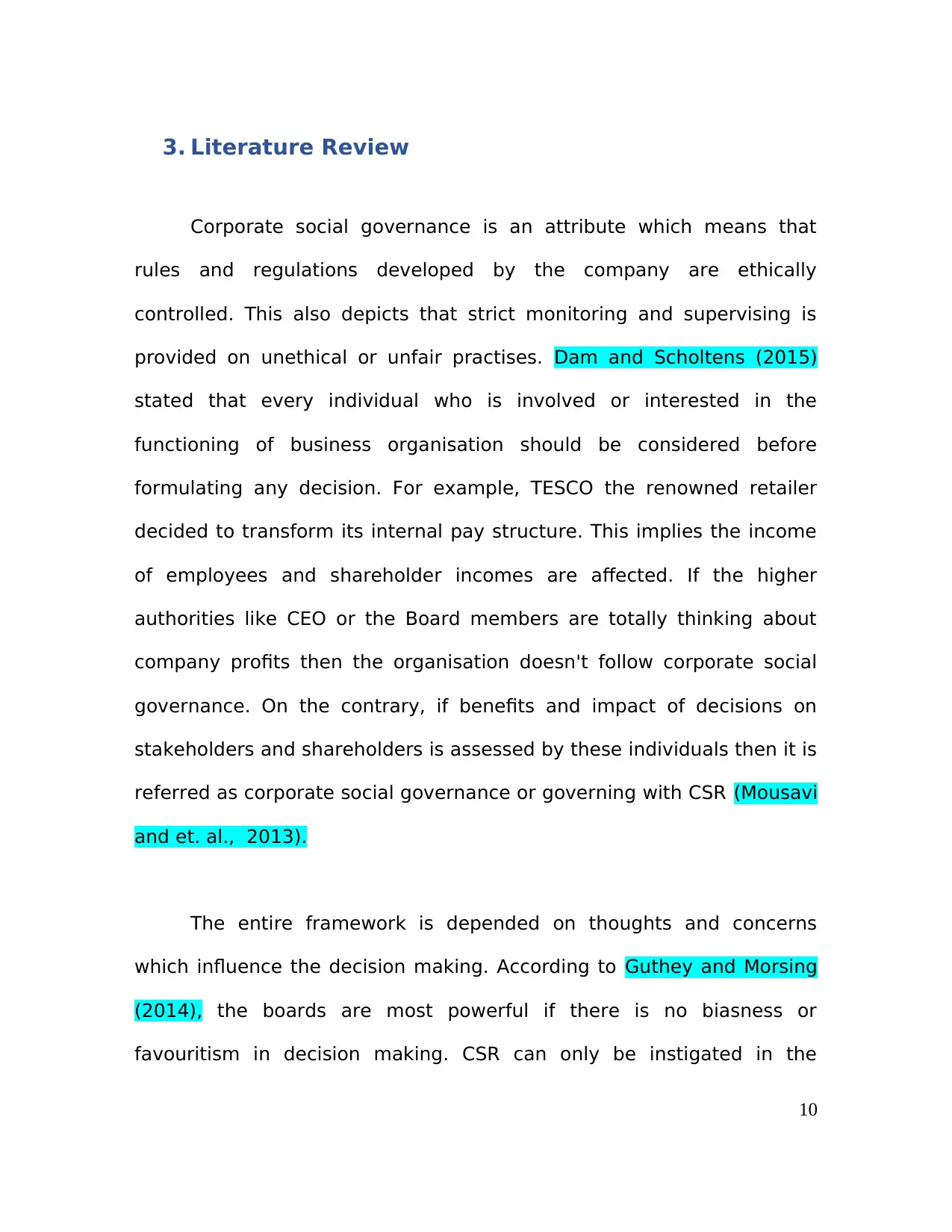
3. Literature Review
Corporate social governance is an attribute which means that
rules and regulations developed by the company are ethically
controlled. This also depicts that strict monitoring and supervising is
provided on unethical or unfair practises. Dam and Scholtens (2015)
stated that every individual who is involved or interested in the
functioning of business organisation should be considered before
formulating any decision. For example, TESCO the renowned retailer
decided to transform its internal pay structure. This implies the income
of employees and shareholder incomes are affected. If the higher
authorities like CEO or the Board members are totally thinking about
company profits then the organisation doesn't follow corporate social
governance. On the contrary, if benefits and impact of decisions on
stakeholders and shareholders is assessed by these individuals then it is
referred as corporate social governance or governing with CSR (Mousavi
and et. al., 2013).
The entire framework is depended on thoughts and concerns
which influence the decision making. According to Guthey and Morsing
(2014), the boards are most powerful if there is no biasness or
favouritism in decision making. CSR can only be instigated in the
10
Corporate social governance is an attribute which means that
rules and regulations developed by the company are ethically
controlled. This also depicts that strict monitoring and supervising is
provided on unethical or unfair practises. Dam and Scholtens (2015)
stated that every individual who is involved or interested in the
functioning of business organisation should be considered before
formulating any decision. For example, TESCO the renowned retailer
decided to transform its internal pay structure. This implies the income
of employees and shareholder incomes are affected. If the higher
authorities like CEO or the Board members are totally thinking about
company profits then the organisation doesn't follow corporate social
governance. On the contrary, if benefits and impact of decisions on
stakeholders and shareholders is assessed by these individuals then it is
referred as corporate social governance or governing with CSR (Mousavi
and et. al., 2013).
The entire framework is depended on thoughts and concerns
which influence the decision making. According to Guthey and Morsing
(2014), the boards are most powerful if there is no biasness or
favouritism in decision making. CSR can only be instigated in the
10
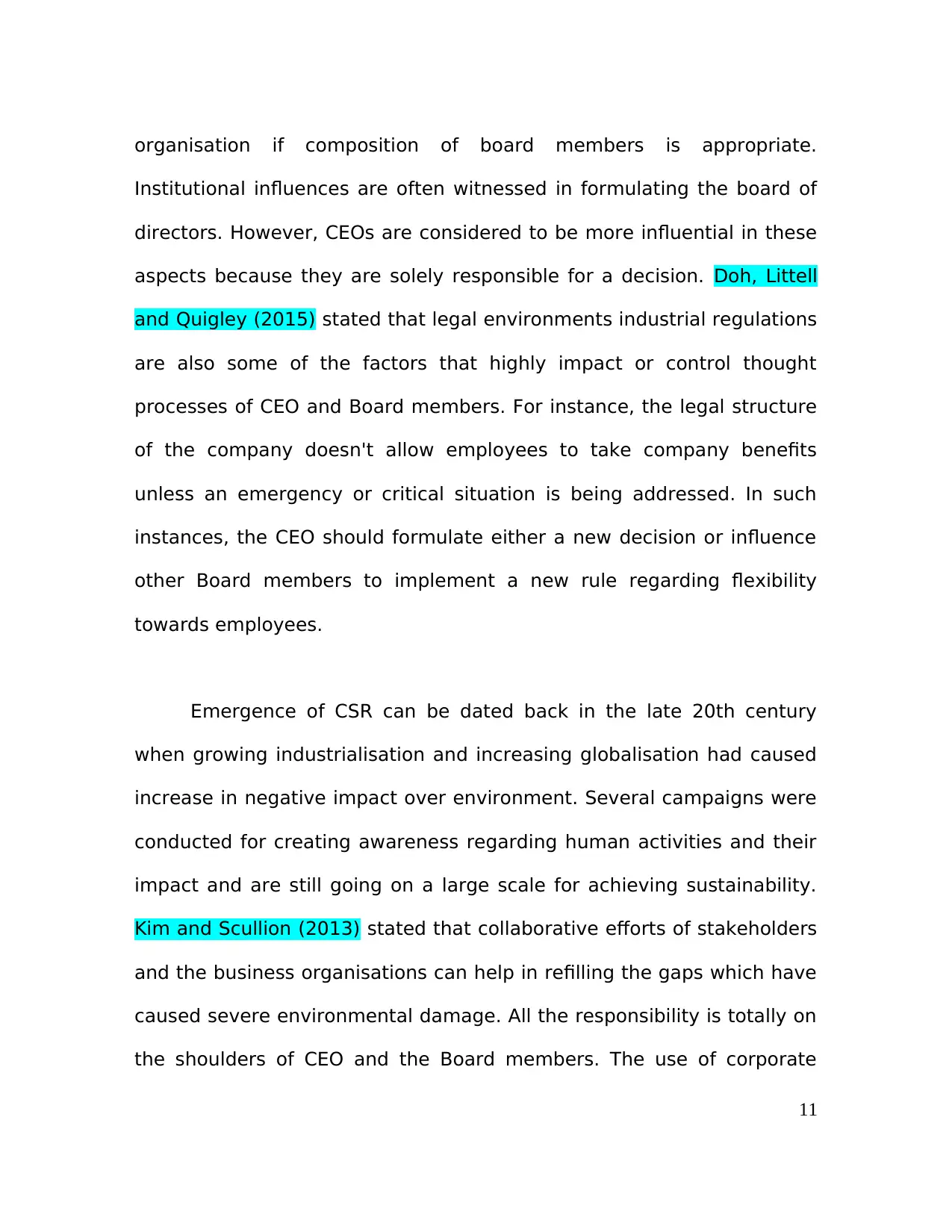
organisation if composition of board members is appropriate.
Institutional influences are often witnessed in formulating the board of
directors. However, CEOs are considered to be more influential in these
aspects because they are solely responsible for a decision. Doh, Littell
and Quigley (2015) stated that legal environments industrial regulations
are also some of the factors that highly impact or control thought
processes of CEO and Board members. For instance, the legal structure
of the company doesn't allow employees to take company benefits
unless an emergency or critical situation is being addressed. In such
instances, the CEO should formulate either a new decision or influence
other Board members to implement a new rule regarding flexibility
towards employees.
Emergence of CSR can be dated back in the late 20th century
when growing industrialisation and increasing globalisation had caused
increase in negative impact over environment. Several campaigns were
conducted for creating awareness regarding human activities and their
impact and are still going on a large scale for achieving sustainability.
Kim and Scullion (2013) stated that collaborative efforts of stakeholders
and the business organisations can help in refilling the gaps which have
caused severe environmental damage. All the responsibility is totally on
the shoulders of CEO and the Board members. The use of corporate
11
Institutional influences are often witnessed in formulating the board of
directors. However, CEOs are considered to be more influential in these
aspects because they are solely responsible for a decision. Doh, Littell
and Quigley (2015) stated that legal environments industrial regulations
are also some of the factors that highly impact or control thought
processes of CEO and Board members. For instance, the legal structure
of the company doesn't allow employees to take company benefits
unless an emergency or critical situation is being addressed. In such
instances, the CEO should formulate either a new decision or influence
other Board members to implement a new rule regarding flexibility
towards employees.
Emergence of CSR can be dated back in the late 20th century
when growing industrialisation and increasing globalisation had caused
increase in negative impact over environment. Several campaigns were
conducted for creating awareness regarding human activities and their
impact and are still going on a large scale for achieving sustainability.
Kim and Scullion (2013) stated that collaborative efforts of stakeholders
and the business organisations can help in refilling the gaps which have
caused severe environmental damage. All the responsibility is totally on
the shoulders of CEO and the Board members. The use of corporate
11
⊘ This is a preview!⊘
Do you want full access?
Subscribe today to unlock all pages.

Trusted by 1+ million students worldwide
1 out of 23
Related Documents
Your All-in-One AI-Powered Toolkit for Academic Success.
+13062052269
info@desklib.com
Available 24*7 on WhatsApp / Email
![[object Object]](/_next/static/media/star-bottom.7253800d.svg)
Unlock your academic potential
Copyright © 2020–2026 A2Z Services. All Rights Reserved. Developed and managed by ZUCOL.





